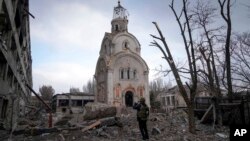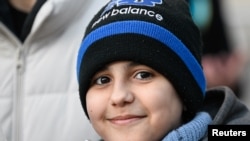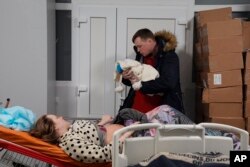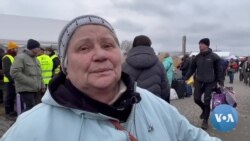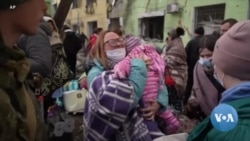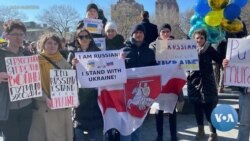For full coverage of the crisis in Ukraine, visit Flashpoint Ukraine.
The latest developments of the conflict between Russia and Ukraine, all times EST:
11:22 p.m.: The New York Times reports that a $700 million superyacht docked in Italy could be Russian President Vladimir Putin's.
10:52 p.m.: A 2020 COVID policy is keeping Ukrainian refugees out of the U.S., NBC News reports.
10:20 p.m.: Mariupol's death toll from the Russian invasion has topped 1,500, The Associated Press reports.
9:49 p.m.: Yahoo News has a look at Ukraine's war-wounded children:
"A plaster on his eye, 8-year-old Dima Kasyanov lies unconscious on a hospital bed in Ukraine's second city Kharkiv after a Russian missile blasted through his home.
"He was in his family flat when it hit on Monday, sending shrapnel shooting through his upper jaw and into the base of his neck, his doctor Oleksandre Dukhovsky says.
9:18 p.m.: The Associated Press fact-checks a video that purports to show footage from Ukraine.
8:49 p.m.: In an attempt to tighten the financial screws on Russian President Vladimir Putin amid the invasion of Ukraine, countries around the world are seizing the prized possessions of oligarchs believed to be close to him. VOA's Laurel Bowman has the story.
8:14 p.m.: Al Jazeera has a graphic detailing which countries are most reliant on Russian for oil.
7:30 p.m.: Deutsche Bank announced Friday it would wind down its business in Russia, according to news reports.
The bank, which had faced criticism for its ties to Russia, joined Goldman Sachs and JPMorgan Chase, the first two U.S. banks to exit Moscow after its invasion of Ukraine.
7:10 p.m.: European Union leaders met Friday outside Paris to discuss the situation in Ukraine and its own military preparedness, Lisa Bryant reports for VOA.
French President Emmanuel Macron, who hosted the two-day meeting at Versailles Palace, said nothing was off the table when it came to further sanctions against Moscow.
But while backing Ukraine's bid to join the EU, the 27-member bloc says it won't fast-track it.
6:30 p.m.: Div Venter is a South African man whose wife, Natalia, is Ukrainian.
Natalia was in Ukraine when the Russian invasion began and has refused to leave, staying to care for her family and to help those needing medicine and food, reports Vicky Stark for VOA.
In stepped Gift of the Givers, which has been doing disaster relief work for 29 years.
5:15 p.m.: An 11-year-old boy, Hassan Al-Khalaf, is being called a hero in Slovakia, after he arrived there a week ago from Zaporizhzhia.
His mother, who couldn't leave his grandmother behind, sent him alone on the 1,000 km journey to Bratislava, where his older brother is studying.
"I want to say a big thank you to the volunteers, because they are helping people they don't even know," Hassan said.
4:45 p.m.: Mykhaylo Shtekel, a correspondent for RFE/RL's Ukrainian Service reports that the Ukrainian port city of Odesa has been turned into a "fortress." He said barricades and checkpoints had been erected throughout the strategic city and that patrols of pro-Ukrainian volunteers from Belarus had captured Russian saboteurs.
3:37 p.m.: Ukraine’s nuclear regulator on Friday provided updated information to the U.N. International Atomic Energy Agency (IAEA) about nuclear power plants now under the control of Russian military forces. Highlights of the report were sent out by the IAEA on Twitter.
4:08 p.m.: The U.S. Treasury announced new sanctions that target Russian and Kremlin elites, oligarchs, and Russia’s political and national security leaders who have supported Russian President Vladimir Putin’s brutal and illegal invasion of Ukraine, according to a Treasury release.
2:27 p.m.: The war on disinformation has been an uphill fight since before Russia invaded Ukraine, with media and fact checkers sifting through thousands of claims about alleged provocations, missile strikes, atrocities, and gains and losses. VOA’s Liam Scott has more.
2:20 p.m.: Obstetrician-gynecologist Kyrylo Ventskivskiy was working a night shift when Russia invaded Ukraine on February 24. He delivered the first baby born in wartime Ukraine. He’s only gone home once since then. The work of his perinatal center in Kyiv has moved to the more primitive conditions of a bomb shelter. Current Time, a co-production of Radio Free Europe/Radio Liberty and VOA, has his story.
2:14 p.m.: A woman who was injured this week during Russian shelling of a maternity hospital in Ukraine’s besieged port city of Mariupol has given birth to a daughter, the Associated Press reports. A photo published by the AP show Mariana Vishegirskaya lying in a hospital bed after giving birth to her daughter, Veronika, on Friday. Another photo shows her husband Yuri cradling their newborn daughter as Vishegirskaya rests.
A pregnant Vishegirskaya was photographed Wednesday as she was being evacuated from the hospital, following the Russian airstrike, and the images of her predicament were published in news reports sent around the world.
The strike on the hospital, which Russia claimed was a legitimate target, killed at least three people, including a child, officials said. Officials say at least 1,200 civilians have been killed in Mariupol since Russia invaded Ukraine last month.
On Friday, the U.N. World Health Organization raised the number of healthcare facilities that have been attacked in Ukraine to 30 so far, VOA’s UN Correspondent Margaret Besheer reported.
The directive applies to Ukrainian nationals, as well as their family members displaced by the conflict, stateless persons and nationals of other third countries who benefited from international protection or equivalent protection in Ukraine, as well as their family members, she said.
Non-Ukrainian nationals of third countries and stateless persons who can prove that they were legally residing in Ukraine on the basis of a valid permanent residence permit and who cannot return in safe and durable conditions to their country of origin are eligible for either EU temporary protection or adequate national protection, depending on the EU country they are in.
1:19 p.m. The United Nations is not aware of any 'biological weapons program' in Ukraine, the U.N. disarmament chief told a Security Council meeting on Friday. Izumi Nakamitsu, U.N. High Representative for Disarmament Affairs, spoke at the meeting requested by Russia to discuss Moscow's claims of U.S. "biological activities" in Ukraine, which were presented without evidence.
Diplomats from several western nations strongly objected to Russia’s accusations, terming it disinformation. France’s representative Nicolas de Riviere said “Neither disinformation nor the veto can mask this harsh reality…Russia can fool neither Russians nor the world.”
Britain’s representative said, “We do not sit in this chamber to be an audience for Russia’s domestic propaganda. We shouldn’t allow Russia to abuse its permanent seat to spread disinformation and lies."
“We’re not going to let Russia get away with lying to the world or staining the integrity of the Security Council by using it as a venue for legitimizing Putin’s violence,” said U.S. Ambassador to the U.N. Linda Thomas-Greenfield.
VOA’s UN Correspondent Margaret Besheer followed the proceedings and captured some of the comments on Twitter.
1:13p.m.: As civilian deaths and injuries in Ukraine grow, United Nations aid agencies warn indiscriminate attacks against civilians and civilian infrastructure may amount to war crimes.
The U.N. human rights office so far has recorded 1,564 civilian casualties, including 564 killed and 982 injured since Russia invaded Ukraine on February 24.
12:57p.m.: In the Ukrainian capital Kyiv, instructors are giving last-minute training to members of the 112th Territorial Defense Brigade as the Ukrainian military prepares to defend the city from Russian attack. Some of the trainees are new recruits with no previous military experience. The training includes how to operate anti-tank weapons provided by Western allies. Radio Free Europe/Radio Liberty has this report.
12:41p.m.: A massive Russian armored column that’s been at a standstill for days north of Kyiv has been dispersed on three sides of the Ukrainian capital, prompting fears the deployment is a prelude to a redoubled offensive.
American defense officials say the Russian forces have moved 5 kilometers nearer to Kyiv, and artillery has taken up what are described as firing positions. The movement coincides with further military developments, including the shelling for the first time of the strategic eastern city of Dnipro, an industrial hub on the Dnieper River and Ukraine’s fourth-largest city.
12:24 p.m.: U.S Vice President Kamala Harris Friday reaffirmed the U.S. commitment to its eastern European NATO allies in the face of the Russian invasion of Ukraine.
Speaking alongside Romanian President Klaus Iohannis following talks in Bucharest, Harris said U.S. commitment to Article 5 of the NATO charter - ‘an attack against one, is an attack against all’ - is “iron clad.” Harris said, “We will defend every inch of NATO territory.”
12:15 p.m.: A senior U.S. defense official briefed reporters Friday about military movements in Ukraine. Russian forces were in the northwest suburbs of Ukraine’s capital Kyiv Friday, the senior U.S. defense official said. However, from the northeast, Russians were “still bogged down in Chernihiv” he added.
Russia is facing challenges because of Ukraine’s stiff, determined, and creative resistance. “They are being adaptive and nimble…almost a hit and run kind of a style here,” the U.S. defense official said. Russia does not have “a military that has great expeditionary capability and experience,” he said, adding that Russian air and ground operations were struggling with coordination.
Ukraine’s air force has about 56 fighter jets still operational, the senior official said, noting that Ukrainian forces are flying only 5-10 sorties per day, as they rely more on other weapons systems. Ukraine is also making good use of its drones, he said. “They’re using them with terrific effect, especially against Russian ground movements.”
VOA’s National Security Correspondent Jeff Seldin monitored the briefing and has more information.
11:51 a.m. : Reuters reports on fears that the war could disrupt Ukraine’s vital agriculture sector and cause food shortages to come.
11:33 a.m.: Hundreds of Nigerian students who were sheltering from Russian bombing in northeast Ukraine have been evacuated and flown back to Nigeria. VOA’s Timothy Obiezu reports that 123 evacuees including an infant arrived at Abuja international airport from Poland early Friday. Nearly 1,100 Nigerians have been evacuated since Russian forces invaded Ukraine last month.
Officials of the Nigerians in Diaspora Commission say students who were trapped for more than a week in Sumy, a northeastern Ukrainian city, were among the latest evacuees. Authorities say another flight carrying evacuees is expected to arrive Saturday from Hungary.
Jessica Otumara was one of hundreds of Nigerians trapped in Sumy. "Being in Sumy for a week and three days as the war had been happening, it was really really scary,” she said. “You could see the panic in the city.” She says making her way out of the besieged city with others this week was a risk she had to take, but that the experience was traumatic.
11:23 a.m. Journalist Maryan Kushnir, a reporter with Radio Free Europe/Radio Liberty’s Ukrainian Service, suffered a concussion during a Russian rocket attack on Ukrainian forces outside of Kyiv early Friday. Kushnir, who was embedded with the Ukrainian troops, reported that the attack occurred in the town of Baryshivka, about 35 kilometers east of the capital.
11:15 a.m.: As Russia’s crackdown on media organizations intensified this week, VOA said in a statement late Thursday that it would continue its efforts to reach people in the region with news and information.
“In spite of the Russian government’s attempts to criminalize fact-based journalism and block access to VOA’s content on Russian social media platforms, the Voice of America remains resolute in its approach to support the free flow of news and information not only in Russian but in every language we broadcast around the world,” said Acting VOA Director Yolanda Lόpez. “We will continue to provide our Russian audience the necessary tools to access timely, accurate and truthful information.”
10:51 a.m. : Russia said Friday it is opening a criminal case against Meta Platforms, the owner of Facebook and Instagram, over reported changes in its rules that allow some users to call for violence against Russia's army and its leadership in the context of the war in Ukraine. Russia’s Prosecutor-General's Office requested that the social-media giant be branded "extremist" and called for Instagram to be blocked in the country. Radio Free Europe/Radio Liberty has the story.
10:40 a.m, U.S. President Joe Biden on Friday announced that Washington and its allies will strip Russia of its “most favored nations” status, allowing countries to further restrict Moscow's economic ties with the world. This move comes as civilian deaths and injuries continue to climb as Russia presses its offensive in Ukraine. Taking questions from the press after his statement, Biden said Russia would pay a “severe price” should it use chemical weapons, as VOA’s White House Bureau Chief Patsy Widakuswara reports.
10:08 a.m, U.S. Vice President Kamala Harris said Friday that Russian President Vladimir Putin shows no sign of being willing to engage in diplomacy. She is in Romania as part of a three-day visit to the region in a show of support for NATO allies following Russia’s invasion of Ukraine.
Harris warned of uncertainty around what Putin will do next, reports The Independent. The vice president made the remarks at a joint press conference in Bucharest with Romanian President Klaus Johannis.
9:53 a.m.: Russian officials have been shifting their explanations in the past two days about why their forces struck a maternity hospital in the besieged Ukrainian seaport of Mariupol, one of more than a dozen health care facilities to have been attacked since Russia launched its invasion of its neighbor. Jamie Dettmer has this report.
9:12 a.m.: Praise for the way U.S. agencies secured and shared intelligence on Russia's plans to invade Ukraine are being tempered by growing concern that one of the Kremlin's disinformation campaigns is starting to take hold in the United States and the West. VOA’s Jeff Seldin reports.
8:57 a.m.: The UN human rights office said Friday there are “credible reports” that Russia is using cluster munitions in its ongoing invasion of Ukraine.
“We have… received credible reports of several cases of Russian forces using cluster munitions, including in populated areas,” said Liz Throssell, spokesperson for the UN High Commissioner for Human Rights in Geneva. “Due to their wide area effects, the use of cluster munitions in populated areas is incompatible with the international humanitarian law principles governing the conduct of hostilities,” she said.
“Civilian casualties are rising daily, as is general human suffering,” Throssell noted. “We remind the Russian authorities that directing attacks against civilians and civilian objects, as well as so-called area bombardment in towns and villages and other forms of indiscriminate attacks, are prohibited under international law and may amount to war crimes,” she said.
8:37 a.m.: A shrinking number of well-known companies are still doing business in Russia, even as hundreds have announced plans to curtail ties. The Associated Press reports.
8:10 a.m.: VOA news reporter Celia Mendoza visited the village of Medyka, in Poland, one of the busiest border crossings since the start of Russia’s invasion of Ukraine. This is what she saw.
6:58 a.m.: Beijing is controlling messaging on the war in Ukraine, analysts and observers say, as social media companies and traditional Chinese state media outlets have been suppressing voices critical of Russia's invasion. VOA’s Asim Kashgarian has this report.
7:45 a.m.: Kira Yarmysh, the spokeswoman for jailed Russian opposition leader Aleksei Navalny, has been added to Russia's wanted list on unspecified charges. Yarmysh's name appeared on the Interior Ministry's registry of wanted individuals on Friday, according to Radio Free Europe/Radio Liberty.
7: 38 a.m.: Jailed Russian opposition politician Aleksei Navalny has called for protests this weekend against Moscow's unprovoked invasion of Ukraine to combat the "propaganda" machine created by President Vladimir Putin. The Kremlin's most vocal critic urged the anti-war movement in a post on Instagram Friday to put aside their fears of being arrested and take to the streets in what is "definitely not a futile fight." Radio Free Europe/Radio Liberty has the story.
7:02 a.m.: China's Premier Li Keqiang on Friday called the situation in Ukraine "grave" and offered Beijing's help in playing a "positive role" for peace while continuing to refuse to criticize Russia, according to The Associated Press. China has offered to serve as a facilitator of talks between the sides, although it has little experience in such a role and would not likely be viewed as a neutral party.
6:47 a.m.: Russian President Vladimir Putin has said that foreigners should be allowed to join the war against Ukrainian forces and approved the handover of captured Western missile systems to Moscow-backed separatists in eastern Ukraine. Putin, speaking at a Russian Security Council meeting on Friday, said he supported the idea of allowing foreign individuals to join Russian-backed forces in Ukraine after Defense Minister Sergei Shoigu said some 16,000 "volunteers" from the Middle East were ready to come to fight in the war on the Russian side. Radio Free Europe/Radio Liberty reports.
6:25 a.m.: A $13.6 billion emergency package of military and humanitarian aid for besieged Ukraine and its European allies easily won final congressional approval Thursday, hitching a ride on a government-wide spending bill that's five months late but loaded with political prizes for both parties.
6:12 a.m.: South Africa President Cyril Ramaphosa says he has been asked to help mediate peace between Russia and Ukraine, after having spoken to his counterpart Vladimir Putin. Some analysts are questioning whether South Africa’s historic ties to Russia could impact its neutrality.
VOA’s Linda Givetash reports from Johannesburg that the prospective role of mediator comes after the country abstained from a United Nations vote to reprimand Russia over its invasion of neighboring Ukraine.
“It's a very tricky situation, because South Africa, by the way, has ties with both countries,” said Bheki Mngomezulu is a professor of political science at the University of the Western Cape. “But in principle, I think that South Africa did the right thing on this Russian-Ukrainian issue by not siding with either side. South Africa is being looked at as a country that does not believe the use of force, but believes in negotiation,” he added.
Earlier this week, Ramaphosa called upon Russia and Ukraine to move toward a mediated cease-fire in a public statement on Twitter.
5:13 a.m.: Agence France-Presse has a map showing major attacks in Ukraine.
4:46 a.m.: ABC News has more on Russia's "volunteer fighters."
4:10 a.m.: The Associated Press reports that Russian President Vladimir Putin has approved bringing in "volunteer" fighters to join the invasion of Ukraine.
3:50 a.m.: A member of Ukraine's parliament shares photos:
3:24 a.m.: Reuters reports Russian-backed separatists have captured Volnovakha, Ukraine.
3:12 a.m.: The International Atomic Energy Agency warned of trouble at the Chernobyl nuclear power plant in Ukraine. The New York Times has the story.
2:37 a.m.: China's premier speaks about Russia's invasion of Ukraine. Reuters has the story.
2:10 a.m.: A Romanian hotel is sheltering Ukrainian refugees. ABC News has the story.
1:37 a.m.: The U.N. Security Council will hold an emergency meeting Friday on alleged manufacture of biological weapons in Ukraine at the request of Moscow, whose credibility on chemical weapons was questioned during a session on Syria.
Russia on Thursday accused the United States of funding research into the development of biological weapons in Ukraine, which has faced an assault by tens of thousands of Russian troops since Feb. 24. Agence France-Presse has the story.
1:10 a.m.: President Joe Biden will announce Friday that, along with the European Union and the Group of Seven countries, the U.S. will move to revoke “most favored nation” trade status for Russia over its invasion of Ukraine.
That's according to a source familiar with the matter who spoke on the condition of anonymity to preview the announcement. The person said each country would have to follow its own national processes. Stripping most favored nation status from Russia would allow the U.S. and allies to impose tariffs on Russian imports, increasing the isolation of the Russian economy in retaliation for the invasion. The Associated Press has the story.
12:37 a.m.: U.S. Vice President Kamala Harris is in Bucharest on Friday, after her visit Thursday to Warsaw, where she underscored the U.S. commitment to NATO’s eastern flank and supported calls for a probe of Russia's alleged bombing of a Ukrainian hospital. White House Bureau Chief Patsy Widakuswara reports.
12:02 a.m.: Acts of vandalism. Cancel culture. Financial hits. Putin’s war on Ukraine is causing problems for some Russians living in the United States. As VOA’s Veronica Balderas Iglesias reports, many oppose Moscow’s aggression and are speaking out for peace.
12:01 a.m.: CNN reports that on Friday, U.S. President Joe Biden will announce that the U.S. will try to revoke Russia's "most favored nation" status.
Some information in this report came from The Associated Press, Agence France-Presse and Reuters.




